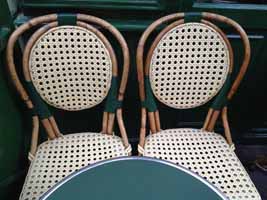The Façade
I had a kitchen pass last night, allowing for an after-the-kids-are-in-bed rendezvous with a girlfriend. We sat beneath the outdoor heaters on the terrace of my favorite café and slowly made our way through a carafe of Côte du Rhone.
The meet-up was not easy to organize. Family commitments and work schedules put our calendars at odds. After a half dozen back-and-forth emails, we realized our lives as professionals and mothers wouldn’t permit a daytime coffee or even a pre-dinner aperitif. The only way to meet was after the children were fed and bathed and tucked into their sheets. This suited me, I like the feeling of escaping my domestic responsibilities,  kissing those tender foreheads and pulling up the covers, closing the door behind me, walking out to the street where unattached people navigate, spontaneously, the free hours of their evenings. Now we, too, were among them, on the terrace, sipping our wine, and as women unhampered with children we could catch up and talk about our lives.
kissing those tender foreheads and pulling up the covers, closing the door behind me, walking out to the street where unattached people navigate, spontaneously, the free hours of their evenings. Now we, too, were among them, on the terrace, sipping our wine, and as women unhampered with children we could catch up and talk about our lives.
What did we talk about? Our children. Whether the French school was right for them, the pros and cons of other education systems, whether a different school in Paris is more suited to cultivating their creative promise. We talked about the little quirks and charms of their emerging personalities, our worries and hopes for them as they grow into little people. In essence, we talked about all the things that we’d escaped from in order to sit at that café together.
Such a conversation inevitably tumbles into the stream of the parenting theories and practices. Last year it was the controversial Tiger Mom, terrorizing her children to perform. This year the spotlight hones in on the French method, contrasting the resulting polite, obedient, no-fuss-at-the-table children with the insolent Veruca-Salt-like youngsters holding their American parents hostage. There’s a lot to be said for it.
My friend is French, but because of stints living in foreign countries, she shares my understanding of being other, as in an expat living abroad, and shies away from stereotypes. Rightly so. They help us describe things in broad strokes, but neglect the nuances that most subject matter deserves. She argued that there are also French parents held hostage by their children. All those French mums in the park will tell you how firmly they parent, but is it that really that way when you peek into their salon? She wasn’t so sure.
“Every parent has a façade,” she said.
* * *
At least once a day I have a moment of maternal despair. It happens quietly, my head lowered while I stack plates in the dishwasher, my back to the family as I fold their laundry, or those first minutes, café-au-lait cupped in my hands after I’ve pushed them out the door to go to school, sighing with relief as their voices circle down the staircase and out of our building. Yes, yes, nothing can eradicate the love and laughter my children have injected into my life, but there is also the un-joyous part of parenting, a tedious  string of commands to get up, clean up, wash up, finish up. Then there are those moments when the required enthusiasm and encouragement I must conjure up is, well, a façade, because I am, mentally elsewhere, in my own creative world, and when I want them to be elsewhere, not underfoot, not speaking to me, asking of me, wanting of me.
string of commands to get up, clean up, wash up, finish up. Then there are those moments when the required enthusiasm and encouragement I must conjure up is, well, a façade, because I am, mentally elsewhere, in my own creative world, and when I want them to be elsewhere, not underfoot, not speaking to me, asking of me, wanting of me.
Do my children notice? Probably. But they seem to appreciate my maternal efforts nonetheless, and they can – and will – get me back for this when they are teenagers.
I tear through the moods of mothering, juggling what I feel with what I’m supposed to feel. Occasionally I sense the tough love of the tiger mom in me. Sometimes I believe I have taken on the practical approach that has now been categorized, as least for the Americans, as French. Other times I’m as indulgent as you can get, on the floor playing with them, giving them choices, watching their imagination flower unhindered. It’s not a very consistent measure. Some days the house must be ordered, I cannot stand to look at their clutter. The next week, I’ll leave the blanketed fort that’s been constructed between the couch and bookshelf standing for days, with its hidden treasures of trinkets and toys and make-believe and odds-and-ends stuffed beneath.
* * *
We all show ourselves to the world by way of the different roles we play. Our professions and familial positions define us broadly: teacher, lawyer, aunt, parent. Adjectives are added to narrow in on the quality of how we execute those roles: lenient, strict, engaged, detached. Battle lines are drawn. You’re a stay-at-home mom or a working mother. (Or a working-while-staying-at-home mother?) You’re a breast-feeder or a bottle-giver. Family bed or let-them-cry-in-the-cradle. It’s easy to glance sideways and make a judgment. I do it. Everyone does.

Sometimes I am certain, and possibly even a bit full of myself, reporting on this blog a conversation or a conflict I feel well handled, constructing a mosaic of proud parenting moments. Other times I disclose – not always without hesitation, and yet these posts are the most powerful – my faiblesses, my #fail moments, my vulnerabilities and obsessions, or the angry rants that seem ridiculous in retrospect but were, apparently, too impassioned for me to contain. When I write about it, I get to construct a façade of who I think I am as a mother, good and bad.
The real façade, perhaps, is that any woman is one kind of mother. The rhythms of our days and weeks and the passages of our lives stretch us across the boundaries of prescribed parenting styles. When I am not overworked, I am more creatively engaged. When I am stressed, I am stricter, firmer, even impatient. When I’m tired, I’m laissez-faire. When I’m inspired, I bake heart-shaped cookies. As I straddle the abyss between my ideal self and my real self, it helps to accept the fact that I might be every kind of mom. Except to Short-pants and Buddy-roo, I’m just their mom, and they seem pretty devoted. Maybe that’s where I should look when taking measure of myself as a mother.


April 13th, 2012 at 5:14 pm
I do think that even as we think we are keeping something hidden, there are vast swaths of parenting that we miss entirely. My daughters see our days very differently than I do, and in their three retellings of a day there are even more differences.
I appreciate the layers of our stories, both in what we share and what we keep buried deep for fear of revealing a truth that might speak to clearly something we’d rather not hear.
I also adore you.
April 13th, 2012 at 7:14 pm
In _ It Was on Fire When I Lay Down on It_, Robert Fulghum tells a marvelous story about the way Marcel Duchamp often replied to the question “What do you do?” Duchamp liked to introduce himself as a “respirateur. ” It was, after all, what he did more than anything else (breathe). His presence among the living was also evidence he was very good at it.
Fulghum suggests recasting our responses to “What do you do?” away from our roles. Simple titles don’t reveal enough, and are often used to judge another’s stature in relation. Instead, why not shape our answers around “what we do that gives us great pleasure or makes us feel useful to the human enterprise.”
While, you’re right to say that with your posts you could “construct a a façade of who I think I am as a mother, good and bad.” That’s not what comes across to this reader. More often–I think–you rise to Fulghum’s challenge.
We all “straddle the abyss” between our ideal and real selves. Perhaps the key, to being “every kind of mom” or dad, is being aware of the risk of the façade, and inviting people past it, the way you do. For me, that’s the great gift of what’s left of your brain. 🙂
April 13th, 2012 at 7:36 pm
I was talking to my Dad about some of this a while ago. He said that it’s a very recent historical construct to talk about “parenting” or “mothering” as verbs. Previous generations tended not to have this anxiety about what it meant “to parent”. He suggested thinking in terms of “family” rather than “parenting,” since the concept of family leaves room for everyone’s needs – kids and parents – that all get thrown in the mix, whereas parenting implies a kind of one way exchange where we “do parenting” to our children but don’t expect them to attend to our needs. I’m not saying that children are responsible for their parents’ needs, but that the concept of family implies a community of multiple (sometimes competing) demands that need to be negotiated, in a way that “parenting’ doesn’t. I found it a really useful way of thinking about it, especially since it teaches kids that parents are also humans with needs, and that relationships are a mutual thing. For me, what it opens up, for example, is a recognition that my need for solitude is a valid consideration in how we create our family life (along with many other needs that I have, and that other members of the family have), rather than feeling guilty that that need is counter to my role as a “good parent.” It might just all be semantics, but I think Dad was on to something.
April 13th, 2012 at 7:51 pm
That was one hell of a post ! brilliant- you captured those moments of vulnerability that we all have as mothers and parents. No one teaches you this stuff – you do it as best you can and yes maybe create a facade to hid those moments when you think’ how do I do this? ‘am I doing ok?’ We benchmark ourselves against the tiger mom, the American mom, the French mom and yet should we not benchmark ourselves as ourselves and look at our kids as the best product of all of our efforts as mothers?
April 14th, 2012 at 1:53 am
I just read all of the above comments and I’m so impressed. I would like to check all of the above. What seems essential to me is that your children know and love you as their one and only mom, yet what they learn from you is infinite, most of which is to love and appreciate themselves and you more and more as they grow into themselves. Great post!! Love the photos too.
April 16th, 2012 at 11:16 pm
This is a brilliant post: I love your twist on the idea that mothers are all things to all people, that all mothers are all kinds of mother. I experience this every day, just like you, and I know the moment of quiet despair you talk about. I also understand that my mood, or workload changes, like a lava lamp, the mothering mode I use.
Thank you for expressing it so well.
Ingrid